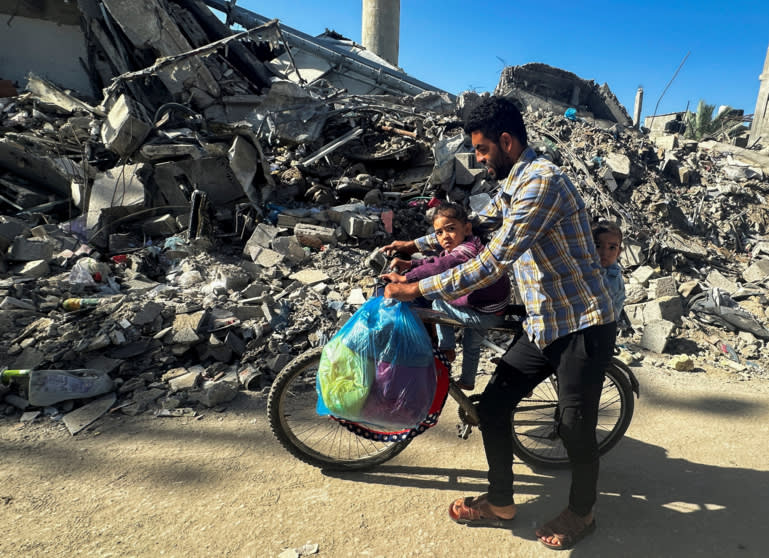Polls, boycott campaign highlight public outrage amid tepid government response

Women wave flags as they gather in solidarity with Palestinians in Gaza during a rally in Karachi on Oct. 20.
ISLAMABAD — Pakistan’s Islamist political parties are playing up support for the Palestinian group Hamas in its war with Israel, aiming to tap into domestic public anger as the country prepares for elections early next year.
After Hamas militants triggered the latest round of the conflict by storming from Gaza into Israel and killing an estimated 1,200 people in early October, Pakistan’s caretaker government adopted a relatively measured tone, urging restraint and the protection of civilians. As Israel’s retaliation has killed more than 13,000 in Gaza, according to Hamas health officials, the Pakistani administration has hardened its rhetoric but not gone far beyond boilerplate condemnations of Israel, with which it has no diplomatic relations.
Among the general public, meanwhile, images of devastation from Gaza have struck a chord and appear to have deepened already pervasive anti-Israel sentiment. A survey by Gallup Pakistan this month found that 91% of respondents backed Hamas in the conflict, while only 2% expressed support for Israel. A youth-led boycott campaign against Western companies, seen as being aligned with Israel, is gaining traction.
It is in this climate that Islamist parties are seeking to expand their voter bases, with Pakistan’s general election now slated for Feb. 8.
Jamiat Ulema-e-Islam-Fazal (JUI-F), Pakistan’s largest Islamist party, is at the forefront of supporting Hamas. Molana Fazal ur Rehman, the chief of JUI-F, traveled to Doha on Nov. 5 to meet Hamas leaders Ismail Haniyeh and Khaled Mashal and expressed solidarity with them.
“I am proud of our leader, Molana Fazal ur Rehman, who is doing his best to help our Muslim brothers in Gaza,” Noorullah, a 25-year-old supporter of JUI-F, told Nikkei Asia. “That’s why my family will continue voting for [JUI-F].”
Palestinian diplomats and leaders based in Pakistan are regularly asked to speak at protest rallies organized by JUI-F.
Other Islamist parties, such as Tehreek-e-Labbaik Pakistan (TLP) and Jamaat-e-Islami (JI), have also held huge rallies in support of Hamas. Siraj ul Haq, the JI chief, visited Doha on Nov. 12 and met Hamas’ top leadership.
Experts say the optics of meeting Hamas officials in Doha are important for these parties, as they seek an advantage over the mainstream forces in Pakistani politics — the Pakistan Muslim League-Nawaz (PML-N) of former prime ministers Nazaz and Shehbaz Sharif, the Pakistan Tehreek-e-Insaf (PTI) party of jailed former leader Imran Khan and the Pakistan People’s Party (PPP).
“Since mainstream parties such as PTI, PML-N, and PPP are not raising the issue of Gaza, Islamist parties not only plan to get votes [based] on this issue but also donations in the name of Palestine,” said Sabookh Syed, an independent analyst in Islamabad who covers religious extremism.
Donation collection booths can be found scattered around Islamabad, mainly set up by Islamist parties that say the proceeds will be used to help Palestinians in Gaza.
Experts link the Pakistani establishment’s relatively cautious approach to the Gaza conflict to the country’s internal political and economic crisis. The economy has been teetering on the brink of default, while the government relies on support from the International Monetary Fund to stay afloat.
“Pakistan is currently trapped in its own internal problems, making it difficult for the country to take an aggressive stand on external matters such as the Gaza conflict,” said Khalid Rahman, chairman of the Institute of Policy Studies, an Islamabad think tank. “Still, the people of Pakistan are not happy with the government’s approach on Palestine.”
A grassroots boycott movement is taking hold, Rahman noted.
“The Western products boycott movement in Pakistan is taking place on a huge scale, which represents the sentiments of the people of Pakistan about Palestine,” he said. “Due to the severity of Israel’s atrocities, this boycott campaign will be long-lasting in Pakistan.”
Israel says its military operations, including airstrikes and a ground campaign, are necessary to cripple Hamas and prevent a repeat of the Oct. 7 attack, which left hundreds of civilians dead including in border communities and at a music festival. But many in the international community have sharply criticized the heavy price Palestinian civilians are now paying. Israel and Hamas paused fighting on Friday to enable the release of some Israeli hostages and allow humanitarian aid into Gaza.
In the past, boycott campaigns against Western products were typically led by Islamists, but this time young Pakistanis on social media are playing a key role.
Kainaat Binte Faisal, 25, a graduate student in Islamabad, has stopped using products from multiple Western multinationals. “I am a citizen of a country that can’t directly help Palestinians,” she said. “Boycott is the least I can do.”
In this context, Rahman said it was only natural for Islamist parties to adopt an aggressive tone against Israel. “If the Islamist parties do not support Palestinians then it would negatively affect their support base in Pakistan,” he said.
Still, some experts stress that the Israel-Hamas war is unlikely to be a deciding factor in Pakistan’s upcoming elections.
Husain Haqqani, a former Pakistani ambassador and currently a scholar at Washington’s Hudson Institute, said that the events in Gaza have energized Islamists and generated strong sentiments in Pakistan, but ultimately the polls will be about the myriad domestic challenges facing the country.
He said parties would likely use the “usual” arguments, such as, “If we were in power, we would do more for the unity of the Muslim ummah,” or community. “But beyond that, I think Pakistan’s election will be decided on Pakistan’s issues, not over the Gaza conflict.”

